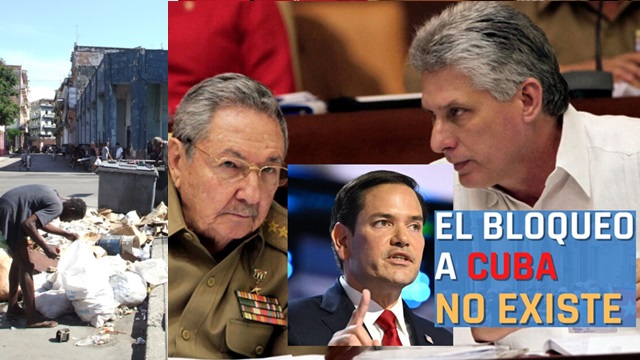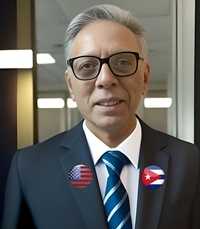 Marco Rubio Debunks the Castro Regime’s Myth About the Blockade
Marco Rubio Debunks the Castro Regime’s Myth About the Blockade
The Myth of the Cuban Blockade: Analysis of Senator Marco Rubio's Speech
Introduction
The Castro dictatorship panicked when it learned that Senator Marco Rubio would be the US Secretary of State nominated by Trump, and redoubled its disinformation campaign to continue deceiving the world by spreading the idea that the cause of the poverty, hunger and economic crisis in which Cuba is mired is caused by what they call the US blockade of the island.
This is how ‘Cubainformación’ presented Marco Rubio when they heard the news:an extremist, anti-communist and anti-Cuban hawk, a visceral promoter of aggression and the blockade against the island, a real architect of hunger for Cuba. As he explained in several interviews, it was he who designed the 243 coercive measures (economic sanctions), added to the criminal blockade against Cuba, which today hit each and every one of the country's sources of income, and which have ostensibly impoverished the living conditions of the Cuban population. A true criminal of the economic war against the suffering but dignified people of Cuba.
Senator Marco Rubio destroyed long ago the myth of the blockade wielded by the Castro dictatorshipa detailed analysis that disproves the Castro regime's narrative about the supposed economic blockade of Cuba in his presentations to the US Senate. His speech exposes how the Cuban government uses this theory to justify the social, political and economic deterioration that has driven Cuban citizens into extreme poverty.
Below I summarise two of Marco Rubio's presentations that defenders of Castroism's claims should listen to so that they know that the only blockade that exists against Cuba is the one created by the communist dictatorship implemented by Castroism.
Political Protests in Cuba Cubans Aren't Protesting Because of an Embargo
Cuba's International Trade
The Reality of Global Trade
- Cuba maintains trade relations with numerous countries
- Annual exports: US$1.2 billion
- Major trading partners:
- China: 461 million
- Spain: 127 million
- Netherlands: 65 million
- Germany: 64 million
Trade With the United States
- Annual imports from the US: $280 million
- 66% of the chicken consumed in Cuba comes from the US
- Half of the soy consumed is of US origin
Busting the Myths of the Blockade
Remittance System
- There is no U.S. ban on sending money to relatives in Cuba
- The only restriction: no use of Cuban military-controlled bank in Panama
- The regime:
- Withholds 10% of remittances
- Bans deposits in dollars
- Delivers devalued local currency to recipients
Tourism and Travel
- There is no restriction for Americans to visit Cuba
- Only limitation: no military-controlled services
- It is allowed:
- Accommodation in private homes
- Consumption in private restaurants
- Shopping in private businesses
- The regime limits the development of private businesses
Medicines and Medical Supplies
- There is no US ban on exporting medicines to Cuba
- The Cuban regime:
- Maintained its own import restrictions
- Imposed tariffs on medicines
- It allowed unlimited donations of medicines
Internet and Telecommunications
- US companies can offer services in Cuba
- Companies such as AT&T, Verizon, and Sprint are exempt from restrictions
- The regime:
- Maintains total control of telecommunications
- Restricts access to control information
Conditions for the End of the Embargo
The embargo would automatically terminate if the regime meets three conditions:
- Release of political prisoners
- Establishment of a free press
- Implementation of multi-party elections
Conclusion
The real blockade in Cuba is internal, imposed by the communist regime on its own people. The recent protests were not against the US embargo, but against the dictatorship and in demand for freedom. The regime responded with repression, arresting peaceful demonstrators, including minors, demonstrating that the fundamental problem is the lack of freedoms and not the supposed external economic restrictions.
The regime's response was repression, arresting peaceful demonstrators, including minors, demonstrating that the fundamental problem is the lack of freedoms and not the supposed external economic restrictions.
José Tarano is a technical producer, graphic designer, collaborator, and researcher at Patria de Martí ► and The CubanAmerican Voice ►. He holds a bachelor’s degree in Electrical Engineering in Telecommunications from José Antonio Echeverria Superior Polytechnic Institute (ISPJAE). In addition, he is the founder and director of Electronics JR Computer Design and Service ►, a computer and information technology services company. Originally from Santiago de las Vegas, Havana, Cuba, he currently resides in the United States.


 🖋️Author Jose Tarano
🖋️Author Jose Tarano